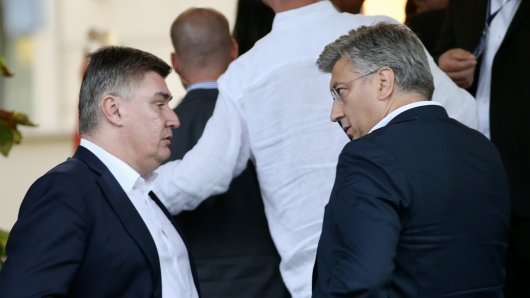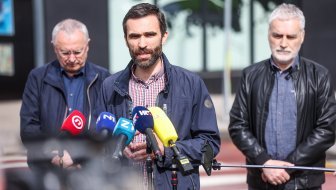Croatian Prime Minister Zoran Milanovic said in an interview with the French television network France 24 on Tuesday that his government, despite the difficult economic situation inherited from its predecessor, can make "a change in running politics and the economy" because Croatia has the potential for change.
"As long as there is a good work spirit, to change things, to make a turn in running politics and the economy, there is room for change in Croatia," Milanovic said.
Speaking of 3.5 billion euros from EU structural funds to which Croatia would be entitled after joining the European Union in mid-2013, he said that those funds would be used for regional development, rural development and infrastructure, citing railway construction and connecting the northern Adriatic port of Rijeka to central Europe.
Highlighting his country's potential for recovery, Milanovic said that "Croatia is a small country, mobile, flexible, with a good tradition in production, a good geographical position, with a strong tourist industry, and policies and politicians ready to change the country. Not hastily, not violently, but we are determined to do it."
When asked about Croatia's low credit rating and a possibility that it would need to turn to the International Monetary Fund for help, Milanovic said he was hoping for a different outcome. "Our rating is like that of the Netherlands or Denmark, but it's not gloomy. The situation is also difficult in some traditional EU members, you know which ones. It's stable. Croatia, of course, is very much dependent on periodic reports by the rating agencies, which is not good in itself and we have to get rid of it."
"Growth projections for this year are middling, but there's no point in looking at the past. We should get down to work," he said, adding that his government had begun fiscal consolidation and cutting budget expenses, which no previous government in Croatia had done. He mentioned a high public debt of nearly 60 per cent of GDP "which is on the verge of becoming toxic."
The interviewer asked him about the government's decision to suspend business operations with Syria in accordance with UN sanctions, which exposed its oil company INA to big losses. "We had great interests for a country the size of Croatia, which speaks a lot. It's big money and we had to renounce it. That's the price of the game," Milanovic said.
When asked if he could guarantee that Croatian companies were no longer doing business with Syria, Milanovic answered by asking about guarantees that the contract would be renewed once the conflict in Syria was over.
Milanovic expressed confidence that Croatia's membership of the European Union would contribute to the bloc. "We think we can contribute to the EU, but we must specialise ..., determine our priorities, know what is important and try to make the most of our membership. I believe we can contribute and benefit mutually, Europe and Croatia."
Commenting on the fact that Croatia was joining the EU while the Union was in a crisis, Milanovic said that people were going through crises all the time and were learning from them.
When asked if his government had the resources to rid the country of corruption, Milanovic compared the situation with the Augean stables from the Greek myth of Heracles, a reference to dirt and neglect, saying: "I hope we stand a chance." He said that his government would not allow corruption to become all-pervasive.
When asked about Croatia's ability to guard the EU's eastern borders once it became a member and its plan to join the Schengen border regime in 2015, Milanovic said he saw no problem in that because both Serbia and Bosnia and Herzegovina were in the process of European integration. He dismissed the possibility that Croatia might have problems joining the Schengen free-travel area, like Romania and Bulgaria, recalling that most European countries had not imposed visa requirements on Croatia in the 1990s, which he said showed that Croatia had not been a problem then either.
Milanovic said that Croatia would actively support its neighbours on their path to EU membership, "as a partner and not as a teacher or mentor". He said that Croatia was generating considerable revenues from trade with Serbia, Bosnia and Herzegovina and other countries in the region, and that it was in its interest that those country should become part of the common market.



































